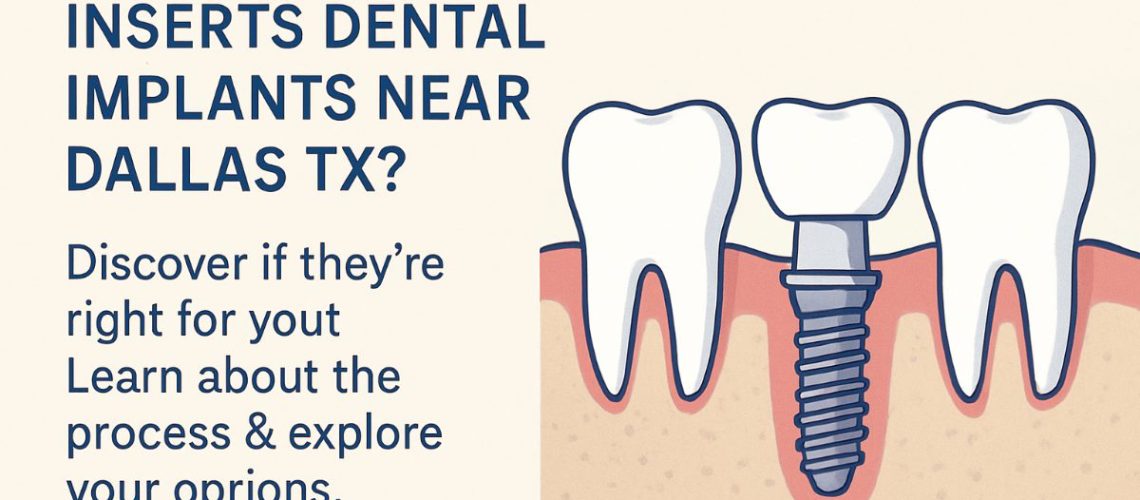If you’ve heard the phrase “teeth inserts,” it’s a common lay term for dental implants. This post will help you decide whether teeth inserts are the right choice for your smile. We’ll cover what implants are, who makes a good candidate, the treatment steps, recovery, costs, and alternatives — including options for teeth inserts dental implants near dallas tx.
What are teeth inserts (dental implants)?
Dental implants are replacement tooth roots made from titanium or zirconia. An implant post is placed into the jaw, an abutment connects the post to a crown or prosthetic, and the final crown or bridge restores function and appearance. Unlike a bridge, an implant replaces the root and won’t rely on nearby teeth. Unlike removable dentures, implants can be fixed in place for chewing stability and a more natural feel. Many people call these “teeth inserts” when talking about implants.
Who is a good candidate for teeth inserts?
General health and habits
Good overall health helps implants heal. Conditions like uncontrolled diabetes, some autoimmune diseases, or treatments that affect bone healing can raise risks. Smoking slows healing and increases failure rates. Your doctor will review your medical history and medications to make sure implants are safe for you.
Bone volume and oral health
Enough jawbone is needed to hold the implant. If bone has shrunk after tooth loss, bone grafting or sinus lifts can rebuild volume for reliable support. Healthy gums are also important — untreated gum disease must be managed before implant placement.
Age and expectations
Adults of almost any age can get implants if their health is good and jaw growth is finished. Implants require a commitment to oral hygiene and follow-up. If you want a long-term, low-maintenance result and understand the timeline, implants are often a good fit.
What to expect during the implant process
Consultation and imaging
Your initial visit typically includes a clinical exam and 3D imaging like a CBCT scan. Digital impressions and careful planning let the team choose the best implant size, position, and any needed grafting. Planning reduces surprises and improves outcomes.
Surgery and same-day options
Surgery is done under local anesthesia with options for sedation. A single implant surgery is quick; full-arch cases may use techniques that allow a fixed provisional prosthesis the same day for eligible patients. Discuss sedation choices and what to expect on the day of surgery.
Prosthetic phase
After healing, you’ll receive a final crown or fixed prosthetic. Many patients wear a temporary restoration while bone integrates — this protects the implant and helps shape soft tissue for the final prosthetic. Timing varies from a few weeks to several months depending on the case.
Recovery, risks, and aftercare for teeth inserts
Typical healing includes a few days of swelling and mild discomfort, which is managed with pain meds and ice. Most people return to normal activities within a few days to a week. Full bone integration takes months. Watch for signs of infection (increased pain, swelling, fever) or loose implants and contact your surgeon if these occur.
Aftercare includes gentle brushing, saltwater rinses early on, and avoiding hard or crunchy foods until cleared. Long-term care means excellent oral hygiene and regular dental checkups. Technologies like guided surgical placement and PRF can improve precision and healing for many patients.
Costs, insurance, and alternatives
Costs depend on how many implants, the need for bone grafts, the type of restoration, and lab work. A single implant with crown is typically less than a full-arch restoration, which can be several times higher. Insurance coverage varies; many plans cover parts of the process but not all. Financing and payment plans are commonly available.
Alternatives include fixed bridges and removable dentures. Bridges are less invasive upfront but rely on neighboring teeth. Removable dentures cost less and are non-surgical but may lack stability and bone-preserving benefits of implants.
When implants might not be the right choice
Implants may not be recommended if you have uncontrolled medical issues, active heavy smoking and unwillingness to quit, severe bone loss and an unwillingness to consider grafting, or unrealistic expectations about time and maintenance. In those situations, bridges or dentures may be better short-term choices.
About Texas Center for Oral Surgery & Dental Implants
Texas Center for Oral Surgery & Dental Implants is a family-owned specialist practice serving the Dallas–Fort Worth area. The team includes board-certified oral and maxillofacial surgeons, an in-house digital lab, IV sedation, and advanced tools like dynamic surgical guidance, CBCT imaging, PRF, and same-day full-arch options to support predictable results for teeth inserts.
Quick decision checklist & CTA
- Do you have one or more missing teeth or unstable dentures?
- Are you generally healthy or willing to optimize health conditions first?
- Is your jawbone adequate, or would you consider grafting if needed?
- Can you commit to daily oral care and regular dental visits?
- Are you prepared for an investment that often lasts decades with proper care?
If most answers are yes, learning more about teeth inserts dental implants near dallas tx is a good next step. Schedule a consultation to review your options, get 3D imaging, and receive a personalized plan for treatment and costs.

